Key takeaways:
- Equal pay advocacy addresses not only fairness but also the broader implications for families and communities, sending critical messages to future generations.
- Implementing equal pay contributes to economic growth, enhances job satisfaction, and fosters a more inclusive workforce.
- Effective advocacy starts with identifying personal passions, gathering information, and building a supportive network of like-minded individuals.
- Sharing personal experiences can empower others and catalyze collective action for change within communities.
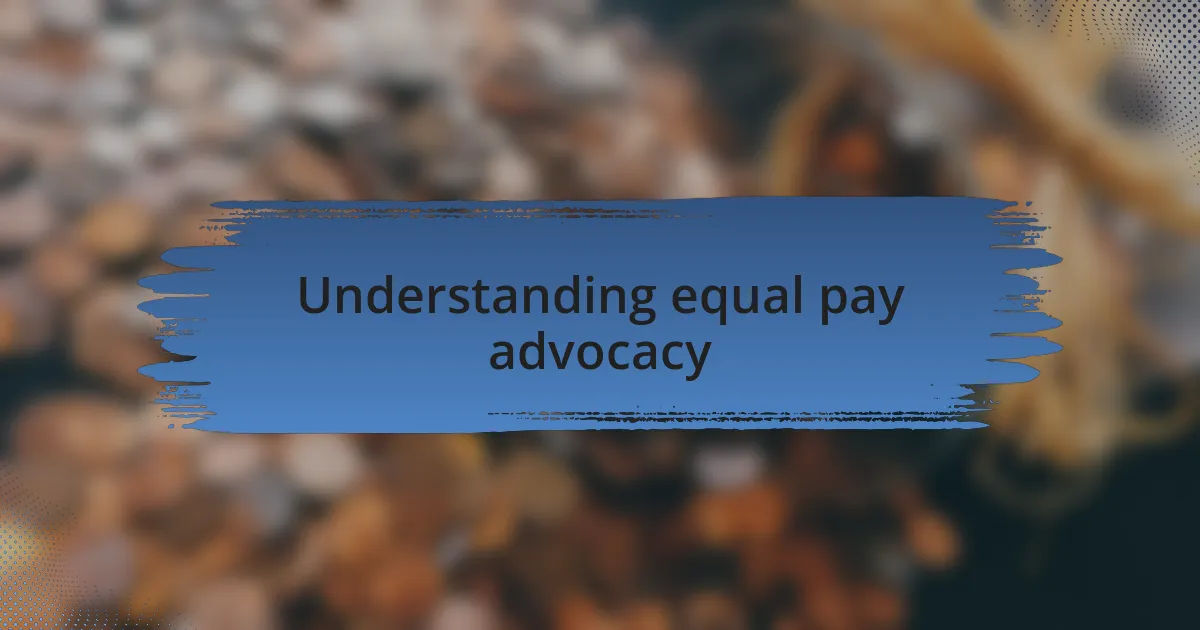
Understanding equal pay advocacy
Equal pay advocacy is about ensuring that individuals receive equal compensation for similar work, regardless of gender, race, or any other characteristic. I remember when I first encountered the disparity in pay among my peers; it struck me as not just unfair, but deeply unsettling. How could talent and hard work be valued differently based on something as arbitrary as gender?
As I delved deeper into the issue, I realized that the implications of unequal pay extend far beyond the paycheck. It affects families, communities, and even future generations. I often ask myself, “What message does this send to young people entering the workforce?” When we allow pay gaps to persist, we subtly communicate that their efforts might not be worth the same amount as others’.
Moreover, equal pay advocacy is not solely about rectifying existing disparities; it’s about changing the culture that allows them to exist in the first place. I sometimes reflect on my own career journey—doing the same work but seeing my male colleagues earn significantly more. This lived experience ignited a fire within me, compelling me to join the fight for equal pay. Isn’t it time we challenge the status quo and push for a system that truly values everyone’s contributions?
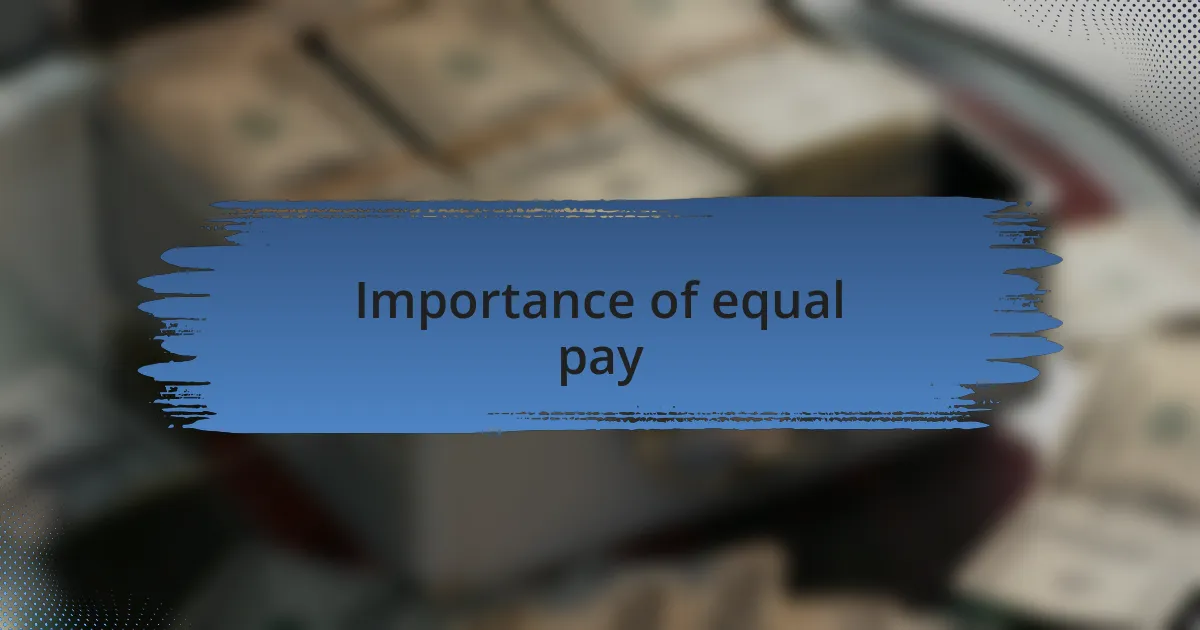
Importance of equal pay
Equal pay is essential not just for individual fairness, but for the overall health of our economy. When everyone earns equal pay for similar work, it stimulates consumer spending, which is the backbone of economic growth. Reflecting on my experiences, I recall how excited I felt when I received a raise, just to learn how many of my colleagues, regardless of experience or output, were earning far more. Wouldn’t it be better if everyone had the same access to that mutual benefit?
Moreover, equal pay leads to increased job satisfaction and retention. In my journey through various workplaces, I’ve seen how employees thrive when they feel valued fairly. I remember a colleague who left for another company because he discovered unequal pay practices. It was a heartbreaking reminder that when people don’t feel compensated correctly, they take their skills elsewhere. Isn’t it time we safeguard talent by ensuring everyone is paid equitably?
Lastly, addressing the issue of pay equity fosters a more inclusive workforce. I often think about how diverse teams bring innovative perspectives to the table. But what if those perspectives are underestimated and underpaid? Advocating for equal pay not only uplifts individuals but enhances the collective strength of our industries. The ripple effects of fairness can transform not just organizations, but entire communities. Don’t we owe it to ourselves and future generations to create an environment where everyone’s contributions are recognized and rewarded equally?
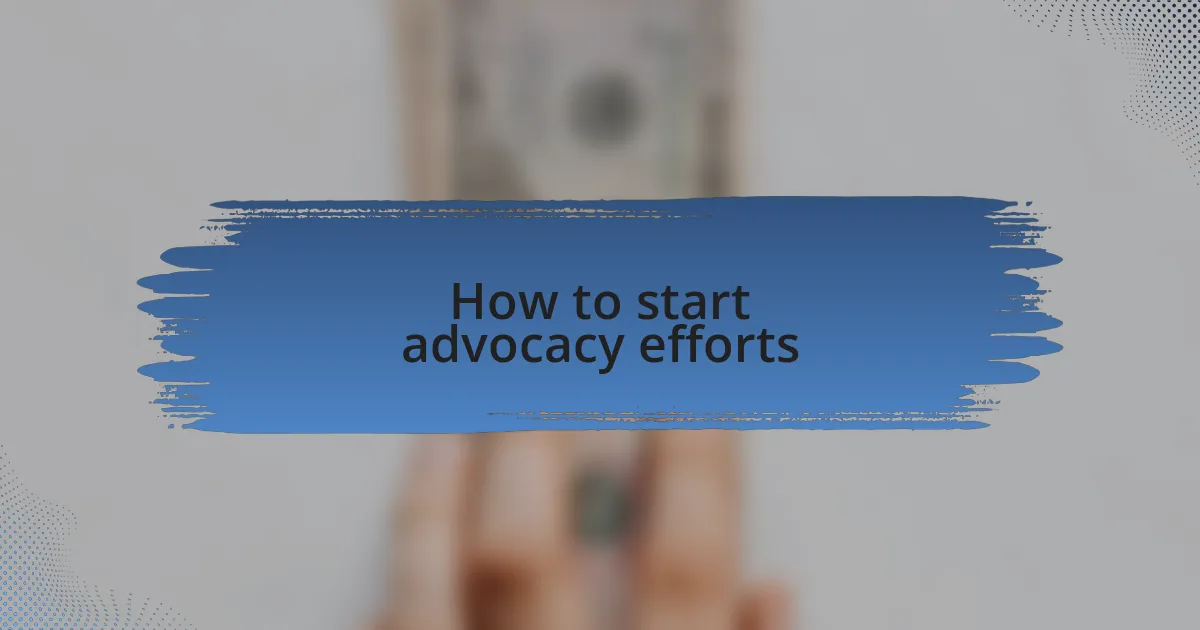
How to start advocacy efforts
To start advocacy efforts, it’s essential to identify your passion areas and set clear goals. For instance, I remember the moment I realized how deeply unequal pay affected not only my friends but also the community around us. That clarity fueled my drive to initiate conversations about pay equity, shaping my goals into actionable steps.
Once you’ve defined your purpose, gather information and resources to support your cause. When I began researching equal pay, I found a wealth of statistics and personal stories that illuminated the issue. Sharing these insights with others not only informed my advocacy but also helped me connect with like-minded individuals who shared my vision.
Mobilizing support involves outreach—don’t hesitate to engage with local organizations and networks. I vividly recall attending a workshop where passionate advocates shared their experiences and strategies. That environment encouraged me to share my own story, creating an invaluable sense of community. Isn’t it empowering to know you are part of something bigger than yourself?
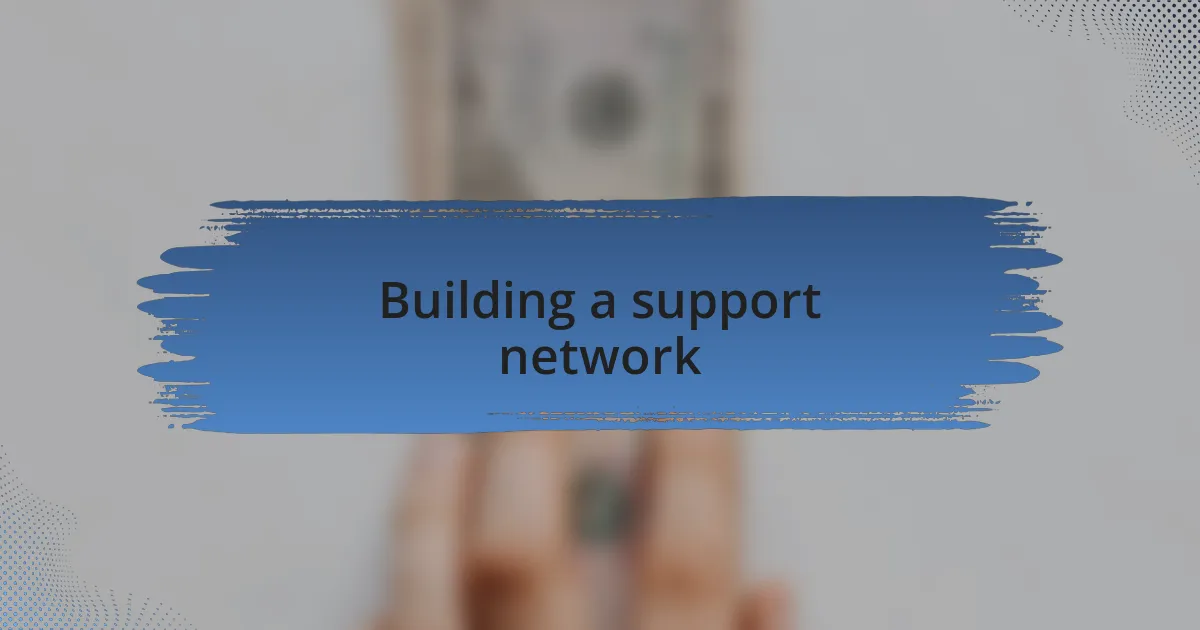
Building a support network
Building a support network is about creating connections that inspire and uplift you. I was surprised by how many people were eager to join the conversation once I started discussing pay equity openly. One simple post on social media led to multiple messages from friends, colleagues, and even acquaintances sharing their own experiences and wanting to collaborate. Have you ever found support in unexpected places?
As I dove deeper into the world of equal pay advocacy, I made a point to attend local meetups and workshops regularly. I remember standing in a circle, sharing laughs and stories with others who understood the struggle for fair wages. These interactions not only equipped me with new insights but also instilled a sense of camaraderie that propelled my efforts forward. Isn’t it amazing how the right company can invigorate your passion?
Finding mentors became a pivotal aspect of my journey. One mentor in particular challenged me to think broader and bolder about my advocacy approach. Their belief in my capabilities helped me step outside my comfort zone, encouraging me to take on speaking engagements and community projects. Reflecting on that support, I can’t help but wonder—who in your life could help elevate your advocacy efforts?
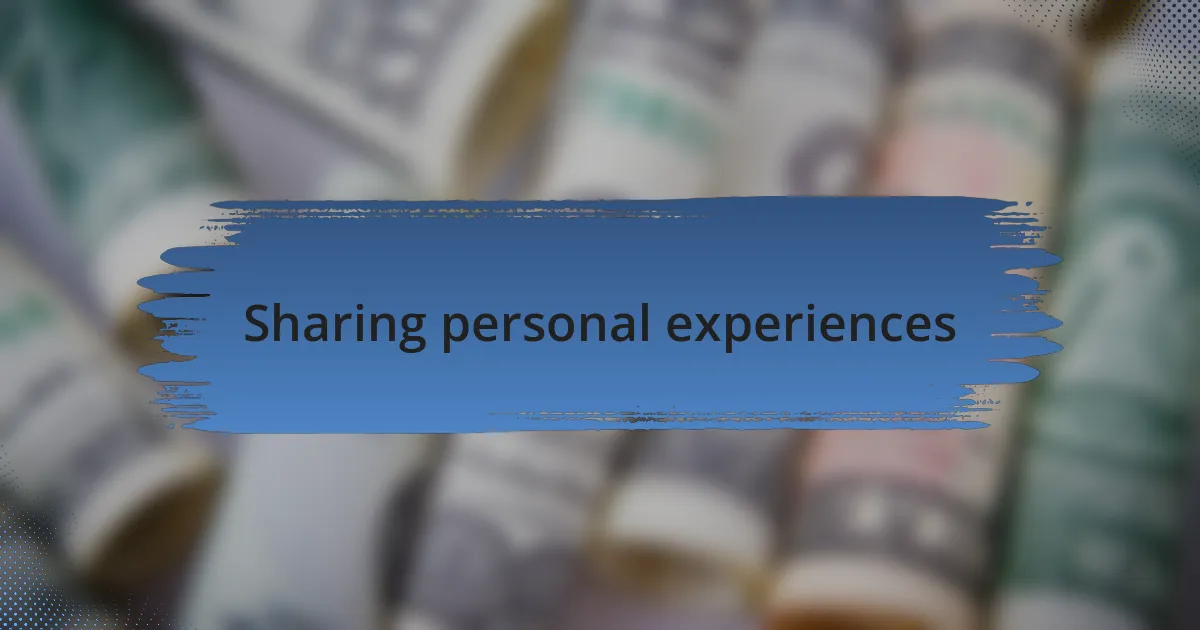
Sharing personal experiences
Sharing personal stories can transform the most abstract concepts into relatable experiences. I vividly recall the first time I opened up about my own struggles with salary negotiations during a community forum. As I spoke, I saw heads nodding and felt the collective energy of shared pain and frustration. It was a moment of vulnerability that struck a chord—that unmistakable feeling of not being alone in the fight for equality. Have you ever felt that rush of connection when your truth resonates with someone else’s?
It’s a lesson I learned early on: sharing my journey not only empowered me but also encouraged others to share theirs. Once, after I shared my tale of a pay disparity, a young woman approached me, her eyes glistening with determination. She told me that my story inspired her to confront her employer about undervaluation in her own job. Hearing that I had sparked courage in someone else felt like the best reward. Isn’t it incredible how one story can ripple through others’ lives?
By documenting my advocacy experiences in a blog, I realized how powerful narratives could support our cause. Each post became a conversation starter, drawing in comments from people thanking me for speaking up about topics they often kept silent. It’s remarkable to think that by offering my perspective, I’ve helped create a platform for others. What stories could you share that might ignite a similar movement in your community?
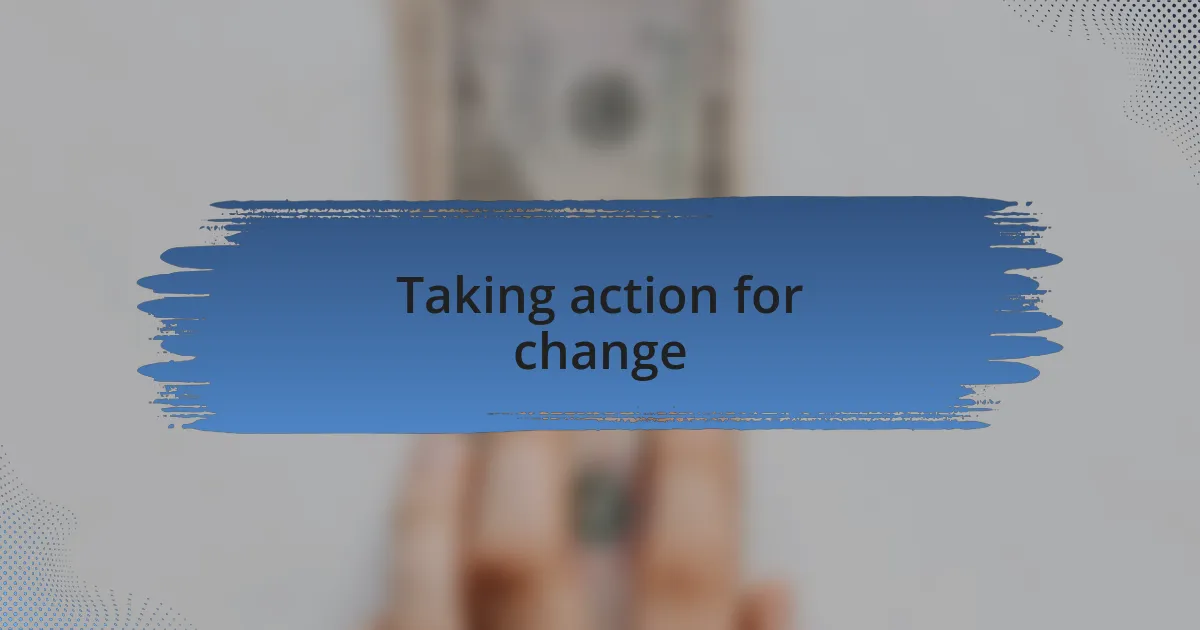
Taking action for change
Taking action for change starts with recognizing the power of collective voices. I remember attending a rally where we gathered to advocate for equal pay. Standing there, surrounded by passion and determination, I felt an exhilarating charge running through the crowd. Seeing so many faces united for a common cause reinforced my belief in the strength of community action. Have you ever experienced that electric atmosphere of shared purpose?
My journey took a more direct turn when I decided to organize a workshop focused on salary negotiation tactics. I shared not just strategies, but also the emotional barriers many face—fear of backlash or simply not feeling worthy enough to ask for what they deserve. It was a nerve-wracking experience, but as I shared the struggles and successes of others, I could feel hope igniting in the room. Isn’t it transformative to see individuals walk away with newfound confidence, ready to advocate for themselves?
Engaging with local policymakers is another vital step in driving change. I once had the opportunity to meet with a city council member who was genuinely interested in the issue of equal pay. I shared my story and the stories of others, emphasizing the need for legislative support. That connection not only deepened my understanding of advocacy but also illuminated how personal testimonies can influence policy. Have you explored avenues in your community where your voice can be a catalyst for change? The journey may be challenging, but the impact can be profound.